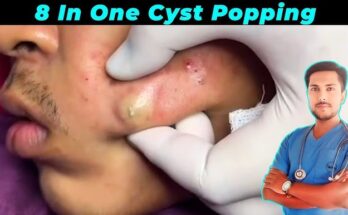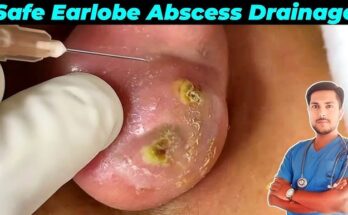Introduction
Acne and blackheads are common skin issues that affect people of all ages, genders, and skin types. While blackheads are a mild form of acne, they can evolve into more severe acne if not properly treated. Whether you’re dealing with stubborn blackheads or more advanced forms of acne, finding the right treatment can be a complex journey. This comprehensive guide provides an in-depth understanding of the causes of acne and blackheads, effective treatment options, prevention methods, and expert skincare advice to help you achieve clearer, healthier skin.
1. Understanding Blackheads and Acne: What They Are and How They Develop
To effectively treat blackheads and acne, it is essential to understand what they are and why they occur.

1.1 What Are Blackheads?
Blackheads are a type of non-inflammatory acne. They develop when hair follicles become clogged with oil, dead skin cells, and other debris. The open pores at the surface turn dark due to oxidation when exposed to air. Unlike pimples or cystic acne, blackheads are not swollen or red.
1.2 What Is Acne?
Acne refers to a broader skin condition that involves clogged pores, which can lead to pimples, cysts, pustules, and blackheads. It occurs when the sebaceous (oil) glands overproduce sebum, which mixes with dead skin cells and other debris, leading to blockages.
1.3 Causes of Blackheads and Acne
Both blackheads and acne can be caused by various factors:
- Hormonal changes: Puberty, pregnancy, and menstruation can cause fluctuations in hormone levels, leading to excess oil production.
- Excess oil production: Overactive sebaceous glands are a significant cause.
- Poor skincare habits: Not cleaning the skin properly, or using harsh products that irritate the skin, can worsen acne.
- Diet: Certain foods, such as those high in sugar or dairy, may trigger or exacerbate acne.
- Stress: Stress increases hormone levels, particularly cortisol, which may lead to more oil production and acne flare-ups.
2. Top Acne and Blackhead Treatments: Effective Methods for Clear Skin
Treating acne and blackheads requires both prevention and targeted treatments. Below are the most effective approaches, from over-the-counter remedies to professional treatments.

2.1 Over-the-Counter (OTC) Treatments
Many individuals begin treating blackheads and acne with products they can find at drugstores or online. These include:
- Benzoyl Peroxide: One of the most common and effective OTC treatments, benzoyl peroxide helps reduce bacteria on the skin, clear out pores, and prevent new breakouts.
- Salicylic Acid: A beta-hydroxy acid (BHA), salicylic acid penetrates deep into pores, exfoliating the skin and helping to dissolve the debris that causes blackheads and acne.
- Retinoids: Retinoids, like adapalene, promote cell turnover, preventing clogged pores and minimizing acne lesions.
- Sulfur: Known for its antibacterial properties, sulfur helps treat acne by absorbing excess oil and preventing bacterial growth.
2.2 Professional Treatments for Severe Acne and Blackheads
For more persistent cases of acne and blackheads, professional treatments can be highly effective:
- Chemical Peels: Chemical peels involve the application of a chemical solution to exfoliate the skin deeply. This can help with clogged pores and overall skin texture.
- Microneedling: This treatment uses fine needles to create tiny punctures in the skin, stimulating collagen production and promoting the healing of acne scars.
- Laser Treatments: Lasers can target and kill acne-causing bacteria, reduce inflammation, and minimize the appearance of scars.
- Extraction by a Dermatologist: In-office extractions, performed by dermatologists, help safely remove blackheads and clogged pores.
2.3 Natural Remedies for Acne and Blackheads
Many individuals prefer using natural treatments as part of their skincare regimen. While they may not always provide instant results, some remedies may help control mild blackheads and acne:
- Tea Tree Oil: This essential oil has antimicrobial properties, making it useful for treating acne and blackheads.
- Aloe Vera: Known for its soothing and anti-inflammatory properties, aloe vera can calm the skin and reduce redness.
- Honey and Cinnamon Mask: Both honey and cinnamon possess antimicrobial properties that may help with acne control.
3. Preventing Blackheads and Acne: Essential Skincare Tips
Prevention is key to maintaining clear skin. By following these tips, you can significantly reduce the likelihood of blackheads and acne forming.

3.1 Consistent Skincare Routine
Developing a consistent skincare routine is crucial for preventing and managing acne. A good routine includes:
- Cleansing: Use a gentle, non-comedogenic cleanser to wash your face twice a day, removing excess oil, dirt, and makeup.
- Exfoliation: Regular exfoliation (2–3 times per week) with a chemical exfoliant (like salicylic acid) can help keep pores clear.
- Moisturizing: Even oily skin needs hydration. Use a lightweight, non-comedogenic moisturizer to keep the skin balanced.
3.2 Avoiding Pore-Clogging Products
Look for skincare products that are labeled “non-comedogenic,” which means they are formulated not to clog pores. Avoid thick creams, heavy oils, and greasy sunscreens that can exacerbate blackheads.
3.3 Healthy Diet
Eating a balanced diet with a focus on whole foods—such as vegetables, fruits, whole grains, and lean proteins—can promote healthy skin. Try to reduce your intake of sugary foods, refined carbohydrates, and dairy products, which may trigger acne in some individuals.
3.4 Managing Stress
Stress management is vital for maintaining clear skin. Techniques like yoga, meditation, regular exercise, and good sleep hygiene can help regulate hormone levels and reduce acne flare-ups.
4. How to Treat Acne Scars and Hyperpigmentation
Even after blackheads and acne are cleared, many individuals struggle with scars and dark spots. Here’s how to treat them:

4.1 Treatments for Acne Scars
- Topical Treatments: Retinoids, vitamin C serums, and alpha-hydroxy acids (AHAs) can help fade hyperpigmentation and improve skin texture.
- Dermal Fillers: For deep scars, dermal fillers may be used to restore volume and smooth the skin.
- Microneedling and Laser Therapy: Both treatments can stimulate collagen production and reduce the appearance of scars.
4.2 Natural Solutions for Hyperpigmentation
Some natural remedies that may help lighten dark spots include:
- Lemon Juice: Contains citric acid, which can lighten dark spots over time.
- Turmeric: Known for its anti-inflammatory and skin-brightening properties.
5. Common Mistakes to Avoid When Treating Blackheads and Acne
Many people unknowingly make mistakes while trying to treat blackheads and acne, which can worsen the condition. Here are some common errors to avoid:
- Over-exfoliating: Excessive exfoliation can damage the skin’s barrier, leading to irritation and more breakouts.
- Picking or Squeezing: Picking at acne lesions can push bacteria deeper into the skin, leading to more inflammation and scarring.
- Using Harsh Products: Harsh scrubs or drying products can irritate the skin, leading to increased oil production and worsened acne.

6. Conclusion
Treating blackheads and acne is a multifaceted process that involves understanding the causes, choosing the right treatments, and maintaining a healthy skincare routine. Whether you are dealing with mild blackheads or more severe acne, the right combination of treatments and prevention strategies can help you achieve clear, radiant skin. Remember to be patient, as it may take time to see results, and always consult with a dermatologist if your acne persists or worsens.
By incorporating a consistent skincare routine, choosing the right products, and avoiding common mistakes, you can reduce your risk of breakouts and enjoy healthy, beautiful skin for years to come.
This topic can be expanded into a 5000-word article by elaborating on each section, adding more details, personal anecdotes, expert opinions, and citing studies where relevant.



